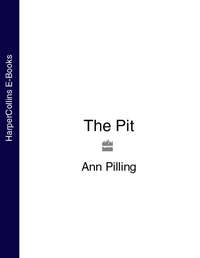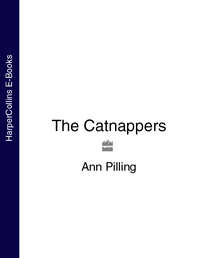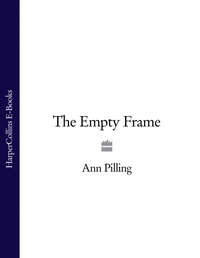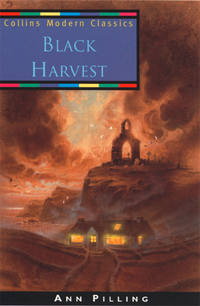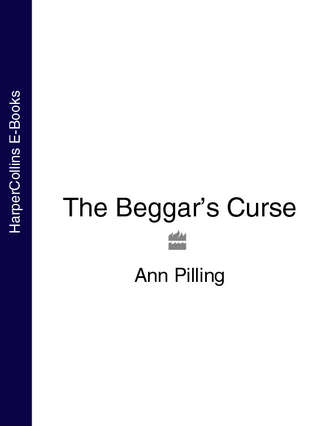
Полная версия
The Beggar’s Curse
“It’s a grim old spot,” she muttered, turning in at a gateway. “Walk down later and have a look. Can’t say I’d fancy living there myself though. I like it up here, where the life is. Welcome to Elphins anyway, dears. Can you sort yourselves out? I’ll just go and find Rose, and I’ll bung the poodles in the shed for a bit, so you can bring your dog in.”
“It’s the best house in the village,” Oliver said firmly. “My father said so.”
“Elphins” was a rambling old place, black and white with a mouldy thatched roof in such bad repair it looked as if giant moths had eaten great holes in it. It was set well back from the road, in a tangled wilderness that must once have been a garden. Prill and Colin looked at it in dismay.
“It obviously needs money spending on it,” Oliver said defensively, “But Molly’s not got any. That’s why she does bed and breakfast. Anyway, I like it.” And he lifted his suitcase out of the car and went up the path. The other two weren’t at all sure. Silently they manoeuvred their trunk out of the back and dumped it on the gravel. “You take that end,” said Colin. “It’s not too heavy.” But as they struggled with it he suddenly felt eyes on his back, and, glancing over his shoulder, he saw the face of Tony Edge staring across the road. The same strange feeling began to creep over him again, making him shiver.
“Hang on,” he lied to Prill. “I’ve not got hold of it properly. Let’s put it down for a minute,” and he turned right round and gave the face a good stare. But it wasn’t Tony at all; this boy was younger, about thirteen, much squatter and more thickset, wearing an old donkey jacket and a dirty baseball cap. But the face was the same, and the same hard, dark eyes were boring into him, making his hands sweat. It was uncanny.
“Look, have you got it?” Prill snapped. “Because I’m cold. . . Well, come on then.”
All the time they were at the car the boy lolled against his fence, watching the proceedings with intense interest. Then the church clock struck six and he stood upright, straightened his cap, and stared up the road. But someone was coming towards them; he suddenly put his hands back in his pockets and slouched against the fence, watching.
They saw the little figure creeping along, a small brown person enveloped in a dingy raincoat and carrying shopping. One hand held a plastic carrier with celery sticking out of the top, the other clutched the handles of an old-fashioned carpet bag.
“Hello, Rose,” the boy called out. She stopped and looked up. Her hair was tucked out of sight inside a brown knitted pixie-hood that buttoned under her chin, and they saw a small oval face, smooth and freckled like an egg. It was hard to work out how old she was; she might have been twenty, thirty, or anything in between. “Want me to carry your bags then?” the boy hollered, and stepped forward.
“No. . . no. . .” Rose stammered. The sad little face didn’t look anxious any more, it looked terrified. She started to run, but just outside Elphins the road was still cobbled and the ancient stones were loose and dangerous. Rose tripped and fell flat on her face. She clung grimly on to the carpet bag but the carrier landed on the cobbles. “Me eggs,” she whimpered. “All me eggs. Fresh today an’ all.”
As the sticky yellow mess oozed out on to the road she started to cry. The boy by the fence laughed loudly. “That’s typical of you, Rose Salt,” he sneered. “You can’t even carry a bit of shopping home. Cheshire born and Cheshire bred, Strong in th’arm and weak in th’ead. That’s you.” And he set off, up the street. Rose, still spreadeagled on the stones, sobbed harder than ever.
The two children were so taken aback they just stood by the car, goggling, but Rose’s wails had brought Molly out of the house. “It doesn’t matter at all, dear,” she said gently, helping Rose to her feet. “It wasn’t your fault. Come on in now, our visitors have arrived. And I saw you’d got tea ready, now that was clever of you, dear.” Then she called up the street in a very different voice. “As for you, Sid Edge, you’re Cheshire born too you know, just in case you’d forgotten. Thick as a brick, like all the Edge family,” she whispered to the two children, steering the sniffling Rose up the garden path.
“Who is Rose Salt?” Colin asked Oliver, when they were getting ready for bed.
“I don’t know. My father never mentioned her. I didn’t know she lived with Molly.”
“I think she’s a bit weird.” Colin was jumping up and down as he pulled his pyjamas on. “This place is freezing. Do you think Molly would mind if I filled my hot-water bottle?”
“Why should she?” Oliver was putting a pair of thick red socks on, to wear in bed. “She’s not the touchy type, you know.”
“No, she’s nice. But what about Rose, Oll? She gives me the creeps. And why does she wear that funny hat all the time? Do you. . . do you think she’s bald?”
The two boys collapsed into giggles, then Oliver pulled himself together sharply. His mother wouldn’t approve of that kind of joke, she was rather religious. “I don’t know. She’s definitely a bit odd. Perhaps she’s the village idiot,” he said slowly.
“Oliver, what a thing to say.”
“Well you said she was creepy,” he said huffily, tucking a scarf round his neck and climbing into bed.
Prill couldn’t get to sleep because of the cold. If this house didn’t warm up soon she’d spend the whole holiday in the kitchen. It had an open fire, and she quite fancied sleeping down there tonight, with Jessie. Colin’s stuff had been in the top half of the trunk. He’d unpacked, then dragged it along the creaking corridor to her room. There was something in the bottom that she hadn’t wanted anyone to see, and she was clutching it now, an old French doll called Amy.
Amy was the most precious thing Prill had. Her grandmother had given it to her on her tenth birthday. It was an heirloom, brought back from World War One by Grandad Blakeman’s father. Prill was too old for teddies and stuffed toys, and this doll usually sat on the shelf at home, above her bed. There was nothing cuddly about Amy, with her disapproving porcelain face, her frilled dress and her real leather shoes.
But she smelt of home, and Prill needed something to remind her of Mum, Dad and Alison. She’d only once been separated from them all before, and it was only for a day or so. She knew she wasn’t going to enjoy this holiday very much, and she didn’t like this cold, dark house either.
Much later, when someone crept into her room, Prill was still awake, though Stang church clock had already struck midnight. When she heard the door open she half closed her eyes and took deep, regular breaths, though her heart was thumping, and she peeped at the figure hovering near the bed.
It was Rose Salt, still in her pixie-hood, but now wearing a long yellow nightie. She stretched out a little brown hand and touched the doll’s blue frills, then ran a finger over the painted face. A tiny sound escaped from her lips. “Ah. . . Ah. . .” she was sighing, tenderly. But at that moment Prill turned over quite violently in the bed, closed her eyes properly, and clutched the little French doll much tighter.
CHAPTER THREE
Molly Bover was a great leaver of messages. Colin came down first next morning and found the kitchen table covered with little notes. One: She’d gone off at seven, with the poodles, and taken a carload of pots to a craft fair near Chester. Two: She would drop Oliver’s film into Kwik Flicks, a new rapid-developing place in Ranswick. Three: Breakfast was on the stove. Four: Her old friend Winnie Webster was expecting them for lunch at twelve-thirty sharp. Her bungalow was easy to find, they just had to follow their noses to Blake’s Pit. “DON’T BE LATE!” she’d added in curly capitals, decorating the exclamation mark with a skull and crossbones.
There were no notes for Rose Salt. Perhaps Oliver was right, perhaps she was a bit weak in the head. She probably couldn’t read. Colin looked all round, but there was no sign of her. The long brown mack had gone from its hook on the back of the door, and the carpet bag had vanished too.
He helped himself to porridge and buttered a pile of toast. If Rose had made the nutty brown bread she could certainly cook. Colin ate so much it was quite an effort to get up from the table. Then he remembered Jessie. Molly had put her in the shed in exchange for the poodles – quite a comedown, after queening it all night by the kitchen fire. She was overjoyed to see him and made a lot of noise. He clipped her lead on and they set off along the village street towards the church. Prill thought his fascination for graveyards was morbid, but Colin quite fancied being an archaeologist, and if you wanted to work out the history of a place you should begin with its church, according to Dad.
Every cottage seemed to have two or three cats and Jessie barked systematically at every single one. As he walked past the village shop a man flung open an upstairs window and bellowed, “Keep that dog quiet, will you!” The shop front was very shabby, and all the blinds were down. “Edge Brothers, General Provision Merchant, High Class Butchers and Poulterers” was written across them in white. It looked anything but “high class”. It was nearly nine o’clock but there were no signs of life at all, and it wasn’t Sunday.
The man at the window was still in his pyjamas. His eyes followed Colin along the street and watched him turn up into the lane that led to the church. The boy’s neck prickled. One quick, backward glance had revealed the Edge face again. It was as if some demon farmer had gone round Stang with a giant butter pat, stamping his mark. It was the same look, the same stare, the same eyes. Awful.
When he saw the church he did another double take. On top of a square, chubby tower there was an elegant steeple, but it was definitely crooked; in fact it was toppling to one side quite alarmingly, like the leaning tower of Pisa. The church was obviously under repair. There was a concrete mixer by the door, a litter of scaffolder’s poles, and some piles of newly cut sandstone blocks, all marked with numbers. A man in overalls climbed down a ladder to talk to him.
“Looks dreadful, doesn’t it?” he said with a grin. “Don’t worry, son, it won’t fall over.”
“Are you underpinning?” Colin asked, rather pleased with himself for knowing the right word.
“Oh no, now that really would mean rebuilding, digging into the foundations, and all that lark. No, the spire’s safe enough. They watch it, you know. Lots of buildings lean a bit, in Cheshire. It’s the old salt workings.”
“Yes, I know.” Cleverclogs Oliver had told them that.
“We’re just renewing some of the stonework on the tower. Some old woman died recently and left this place all her money. Good for trade, of course.” He started to go back up the ladder. “You could come up and have a look tomorrow, when the boss isn’t around,” he added in a whisper, pointing a finger heavenwards to a pair of legs.
“I might. . . Thanks,” Colin said. But as he watched the man crawling spider-like up the underside of the toppling spire he felt quite sick and closed his eyes. It was such a delicate steeple and it leaned so horribly. He could see the weight of the cheerful builder dragging the whole thing down. . .
For a while he wandered round the churchyard, looking at the graves. Everything was very overgrown; daffodils had speared up through the grass but they were still tightly closed, and the trees remained a sullen brown. How cold and damp it all was. He had no gloves, scarf, or hat. Just for once he quite envied Oliver all those winter woollies.
The graveyard was dominated by three names: Edge, Wright and Bover. Others had come and gone, but these families had obviously been around for centuries. There were dozens of Wrights, and about twenty Bovers, but the Edges outnumbered everyone else. It was as if they had a stranglehold on the village.
Colin noticed that several people in Stang had lived rather short lives. One stone marked the death of James Weaver in 1803 “Whom Neptune Deprived of Life”. He was only seventeen. There was an Isaac Bostock and his son Samuel who had both died “pitifully”, in a drowning accident. Where? Could it have been Blake’s Pit? But there was nothing to say. Most pathetic of all was the grave of the three Massey children, “tragically lost” on the night of April 21st 1853. How and why they were “lost” the crumbling headstone did not reveal.
The Edge clan, on the other hand, had obviously enjoyed rude health. They’d had large families and most of them had lived into ripe old age. This dank, cold village in the valley bottom obviously suited them perfectly.
At ten o’clock Oliver was walking towards Blake’s Pit with a Thermos flask under his arm. Molly had left it out for Rose to take to a sick old lady in the village. “Now I’ll leave it ready on the kitchen table,” she’d said last night. “Rose? Are you listening, dear? Don’t forget it, will you? Miss Brierley likes her drop of soup. Now don’t forget it, Rose.” But she had, and Oliver had found the red flask still on the table. He didn’t mind taking it to Miss Brierley’s cottage, he was quite used to old people, and they didn’t bother him in the way they seemed to bother his cousin Prill. She’d pulled a face when Molly suggested they might drop in on this old lady, now and again.
Her tiny cottage was called Blake’s End. It was easy to find because it was the very last house in the village. The only other place anywhere near it was an untidy farmhouse, with an ancient caravan in a field at the front. This was Pit Farm where Tony and Sid Edge lived with their parents and their sister Violet.
The caravan was apparently let to a family of cousins. It was moored at the edge of a great sea of rusting machinery, old radiators, car tyres, and lumps of old iron. Oliver walked past slowly, to get a good look. In a place like Stang there might be some old farming tools. There might even be a man trap. . .
As he lurked in the lane the caravan door opened and three small children sidled out to inspect him. They were pale-faced and doughy-looking, overweight and squat, a bit like puddings. They stared at Oliver, all in a row, like a set of small toby jugs.
But he wasn’t going to be put off by three little kids. In the long grass he could see something quite promising, a cruel-looking cutting instrument with spikes. He bent down to look at it but the Puddings never took their gaze off him. They followed every move he made with their hard little eyes. Then one of them yelled, “Mam! Mam!” and a face popped out from the doorway. “Keep your hands off that!” the woman shrieked. “This is private property. So clear off!”
Oliver grabbed his Thermos flask and fled, hardly daring to look up at the cheerless farmhouse where the Edges lived, and he didn’t stop running till he was outside Miss Brierley’s door, at Blake’s End.
Nobody answered his knock, so he just walked in. The old lady’s bed was in a corner under the window. She lay propped up on pillows but her eyes were shut, and her breathing was irregular and noisy. Rose Salt sat on a chair by the bed, reading slowly and carefully from a copy of The Times.
Oliver felt rather ashamed. She could read then, and with some expression and feeling. “Rose,” he whispered. “I’ve brought the soup from Molly. You left it behind.” Her sad brown eyes slid from the newsprint to the red flask, then to his face. She said nothing, only shook her head slightly, and went on reading. The Times was obviously Miss Brierley’s bedtime story. She was dozing off quite nicely now, and Rose was pleased.
Oliver walked slowly down the hill again, towards Blake’s Pit. The old woman was dying, he’d realised that the minute he entered the house. It wasn’t the smell, or the harsh breathing, or the papery chalk-white cheeks, or the lifeless hair. It was something in the air. Death waiting.
It didn’t worry him. Several of his mother’s old people had been carted off to hospital and never brought back. In time, others, equally old, had replaced them. That was life. But a death like this would upset Prill. She was a touchy, nervous kind of person, with too much imagination for her own good. Oliver hoped the old woman would hang on for a bit longer, at least till they all went home.
Her cottage was in a prime spot, with a perfect view of Blake’s Pit down below. Oliver hadn’t realised it was quite so big, and he’d forgotten how round it was. The still waters looked very broody and dark today; there was no sun, and rain was threatening. Black Pit was its original name, according to his father, and the locals said it was bottomless.
He shivered slightly, turned up his collar and headed for Elphins. He didn’t see the three twisted little faces peering at him through the dirty caravan window, or Sid and Violet Edge spying down on him from their upstairs landing, cracking jokes about his skinny little legs.
Prill had got up very late and spent the morning writing a letter to Angela Stringer. On their way up to Winnie Webster’s bungalow she dropped it in the letter box outside the Edges’ shop.
“Dear Angela,” she’d written. “We’re here, and guess what? I’ve won second prize in a competition. First prize – two weeks’ holiday in Stang, Second prize – three weeks’ holiday in Stang. Ha Ha, funny joke. Do you get the message? It’s awful. We’re all freezing to death in this house. Molly Bover’s quite nice, arty, but definitely rather vague, and forgets half you say. Someone lives in called Rose Salt. She cooks and cleans up, and looks a real weirdo. I should think she’s got no parents – Molly’s the sort of person who seems to like helping ‘lame dogs’.
And while I’m on the subject, she’s got these two horrible poodles called Potty and Dotty. Last Christmas someone left them behind, in an empty house, and Molly saved them from the vet’s needle! They obviously get on her nerves, but she felt sorry for them. ‘One of life’s nice people’, as your dad would say.
Everyone round here is either old or peculiar, or both. There’s a vile family called Edge that seems to rule the village and has a finger in every pie. Nobody likes them, not even Molly. Their Tony (18) is the local heart-throb. Honestly, you should just see him.
I am going riding by the way, Molly’s said she can fix it up for me. There are some horses in the village, three in a field just outside my bedroom window. But guess what? On closer inspection the one I really fancied turned out to be an old carthorse!
Now don’t forget to write.
In deepest gloom, Prill.”
It really was a masterpiece of spite, and Prill put it in the letter box feeling rather uncomfortable. She hoped the Reverend Stringer wouldn’t read it too. If he did, he’d probably drop straight on to his knees and start praying for her soul.
CHAPTER FOUR
Winnie Webster must have been lying in wait for them behind her front door, because the minute they knocked it opened quickly and they were ushered inside. She talked non-stop as she drew up chairs and made them sit down in a small, crowded room. Jessie, curiously cowed by the atmosphere, came in rather unwillingly and slumped at Prill’s feet. But the minute she wagged her tail all the ornaments on the mantelpiece rattled.
“Oh dear,” Miss Webster said doubtfully. “I didn’t know you had a dog. I’m a cat person myself. Do you think—”
“I’ll take her outside,” Colin said abruptly, getting up. Nobody wanted Jessie in Stang; even Molly had forgotten she was coming. He felt rather depressed as he knotted her lead round the bars of the garden gate, and the odd cooking smells that issued from Winnie’s kitchen didn’t do much to cheer him up. Molly had warned them that she was rather keen on health foods, and it was hours since breakfast.
She gave them all a pre-lunch drink, with hard seeds at the bottom and what looked like dead leaves floating about on top. “Cinnamon,” she explained crisply, watching Prill trying to fish her bits out. “Nothing added. All freshly squeezed. Drink up now, lunch in twenty minutes.”
The three children swallowed the strange brew obediently. Winnie Webster was like that; very small, but with a hard steel core, bustling and energetic – a little human dynamo. She was also a mad keen gardener. Outside the window a plump young man in jeans was scratching his head over an obstinate lawn mower. “That’s Porky Bover,” she explained. “No, no relation to Molly, except way back. He’s my right hand in this great garden. A marvellous worker. Now then, let’s have a chat.”
But all they did was listen. Oliver had Winnie Webster taped in about two minutes. Women like her were always coming to see his mother. She was a Committee Lady. She went on and on about church fétes, and Christmas bazaars, and children’s pantomimes. Her life blood was in all this, now she’d retired from school teaching. But what she most wanted to talk about was the play. “You do know about it, of course?” she said, pausing only to draw breath before rushing on.
“Sort of,” said Colin, though all Molly had told them was that some of the men and boys in the village put a play on at Easter time. It was very ancient, something to do with St George and a lot of other knights. There was a great deal of fighting in it, but everyone made friends at the end. The dead men came back to life, and they all danced round together.
“King George actually,” corrected Winnie. “But yes, he’s a saint, of course. My dears, you wouldn’t believe the trouble I have every year with Stang Mummers.”
“Mummers?” Prill repeated. “Aren’t there any words?”
“Oh yes, pretty crude and simple they are too, like nursery rhymes really. But people still have trouble learning their lines, and of course the Edges are quite hopeless.”
“But I thought mumming meant miming?” Oliver said cleverly.
“Oh it does, and you’d expect it to be performed in silence, I know. Pity it’s not; I wouldn’t have quite so many problems then.”
“So who’s in the play?”
“Just the three old village families, the Wrights, the Bovers and the Edges, worst luck, and only the men. Women can’t take part. Porky’s always in it, he does the women. Oh, he doesn’t mind, he’s one of the more sensible members of the cast. Pity the others don’t copy.”
“I’d quite like to read it,” Oliver said. His father hadn’t told him much about this, and it sounded interesting. “Have you got a copy of the words?”
Winnie Webster hesitated. “Ye-es,” she said slowly. “But I can’t let you borrow it, I’m afraid.”
“Why not?”
A dark pink flush was creeping slowly over her cheeks. She looked distinctly uncomfortable. “Well, it’s silly really, but there are a lot of funny customs connected with this play. It’s been done for so many years, you see. Certain families always take certain parts, and everything’s got to happen in exactly the same way. One of the things they insist on is that only the players have the words. They think it’s bad luck if an outsider sees them, or a woman.”
“But you’re a woman,” Oliver said rudely. He was now determined to get his hands on it.
She laughed. “True, but I’m the producer, dear. If I wasn’t around they’d end up fighting. Anything that involves the Edge family is always impossible to organize. They’re so difficult, I just can’t tell you. And this year we’ve got another problem, we’ve no King George.”
She took a framed photograph down from the mantelpiece. “Dear Noel,” she murmured. “This is my nephew, Noel Wright. He’s a very distant cousin of yours, Oliver. Noel usually plays George, and he’s a splendid actor. But this year his company decided to send him to America for six months. Well, of course he couldn’t turn that down, not even for Stang Mummers, so I’ve asked young Mr Massey to do it.”
They all looked dutifully at the photograph. “Dear Noel” was a chinless wonder, with piggy little eyes, a spotted bow tie, and sleek hair parted down the middle. George Massey, a TV producer, who’d recently moved into a brand-new house opposite Elphins, just had to be an improvement. He’d waved to the children that morning as they came out of Molly’s gate, a big man, with a bushy blond beard, and a red T-shirt that said “Ranswick Thespians”. He was a very keen amateur actor.



